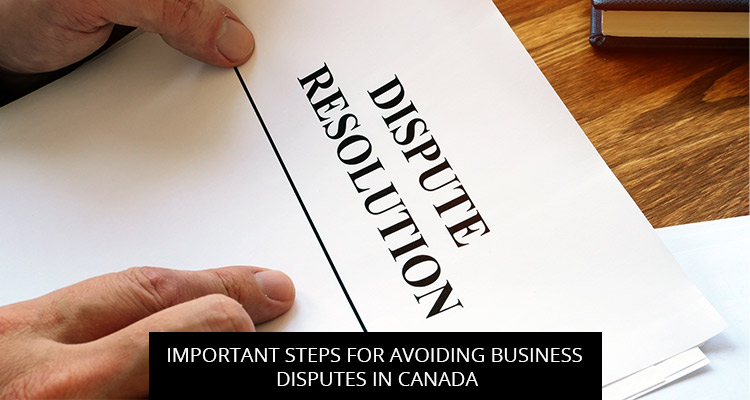
Many people opt for partnership models for their businesses. When businesses are run by more than one business owner, it is most likely that the business may face disputes due to misaligned goals and visions of the partners. Disputes in business partnerships can arise due to various reasons.
Here are some common factors that can lead to conflicts among business partners in Canada:
- Unequal contribution or effort between the partners can lead to resentment and disputes.
- Differences in decision-making styles, preferences, or authority can lead to disputes.
- If there is a partnership agreement in place, disputes can occur if one partner violates or breaches the terms and conditions outlined in the agreement.
- Inadequate communication or a breakdown in communication channels can lead to misunderstandings and conflicts.
- Personal differences, interpersonal conflicts, or incompatible working styles between partners can spill over into the business partnership and escalate into disputes.
What Precautionary Measures Can Be Taken To Avoid Business Disputes?
A clear and comprehensive partnership agreement is the key to bade goodbye to business disputes. A partnership agreement is a legally binding document, outlining the rights, responsibilities, and expectations of each partner, as well as the rules governing the operation and management of the partnership. Therefore, you should consider the following:
- Define the partnership structure
Clearly specify the type of partnership (e.g., general partnership, limited partnership) and the roles and responsibilities of each partner. This includes decision-making authority, profit sharing, and capital contributions.
- Outline the financial aspects
This factor can make or break your business. You must clearly define how profits, losses, and expenses will be allocated among each other. Include provisions for capital contributions, distributions, and how additional funding will be handled if needed.
- Establish exit strategies
This once again is a leading factor to anticipate if you are thinking of starting a business. You must include provisions for partner retirement, disability, death, or voluntary withdrawal from the partnership. Address how the partnership will handle the acquisition of a departing partner’s interest and how the value will be determined.
- Address dispute resolution
Establish a process for resolving conflicts and disagreements among partners, such as mediation or arbitration. This can help avoid costly and time-consuming litigation in case of disputes.
- Non-compete and confidentiality clauses
Protect the partnership’s interests by including provisions that prevent partners from competing directly with the business or disclosing sensitive information to third parties.
Pro-tip: Remember, reviewing and updating your business agreement, considering the business dynamics and legal regulations can help prevent misunderstandings and minimize disputes, and provide a clear framework for the smooth operation of the partnership.
Always Try To Solve The Dispute Through Alternative Dispute Resolution Methods
In Canada, disputes between business partners can be resolved through various Alternative Dispute Resolution methods, including negotiation, mediation, and arbitration. When choosing the appropriate dispute resolution method, it is essential to consider factors such as the nature and complexity of the dispute, the desired outcome, time constraints, cost implications, and the existing partnership agreement or contract provisions.
Here are some commonly used approaches:
Negotiation: This is the most informal and cost-effective method of resolving disputes. Business partners can try to resolve their issues through direct discussions, often with the assistance of legal counsel. Negotiation allows for open communication and can lead to mutually acceptable resolutions.
Mediation: Mediation involves the appointment of a neutral third party, known as a mediator, who facilitates discussions between the disputing partners. The mediator helps them identify issues, explore potential solutions, and reach a mutually acceptable agreement. Mediation is a voluntary process, and the outcome is non-binding unless the parties agree otherwise.
Arbitration: In arbitration, the dispute is presented before an arbitrator or an arbitration panel, who acts as a private judge. The parties agree to be bound by the arbitrator’s decision, which is usually final and enforceable. Arbitration can be faster and more flexible than litigation, and the process and rules can be customized to suit the parties’ needs.
Go For Litigation If Anything Doesn’t Work
Litigation: If all other methods fail or are inappropriate, partners may choose to resolve their disputes through litigation in the court system. Litigation involves filing a lawsuit, presenting evidence, and allowing a judge or jury to make a final decision. Litigation can be time-consuming, expensive, and formal, but it provides a legally binding resolution.
Check Through And Through Before Finalizing The Business Agreement
It is important for business partners to establish clear expectations, open lines of communication, and a well-drafted partnership agreement that addresses potential areas of disagreement. Always put everything in writing. Regular communication and periodic review of the partnership’s goals and operations can help mitigate disputes before they escalate.
Contact The Lawyers At Ayaz Mehdi Professional Corporation
If you want your partnership agreement to be tailored to your specific needs and compliant with the applicable laws in your jurisdiction, or require assistance regarding any business dispute, please get in touch with us.
Disclaimer: Kindly note that sending or receiving information through this site does not establish a solicitor-client relationship. Legal matters are fact-specific, and the law is variably changing. The views expressed and the content provided on this blog are general guidelines and cannot substitute for proper legal advice. Schedule your legal consultation by clicking here: Let’s meet!






